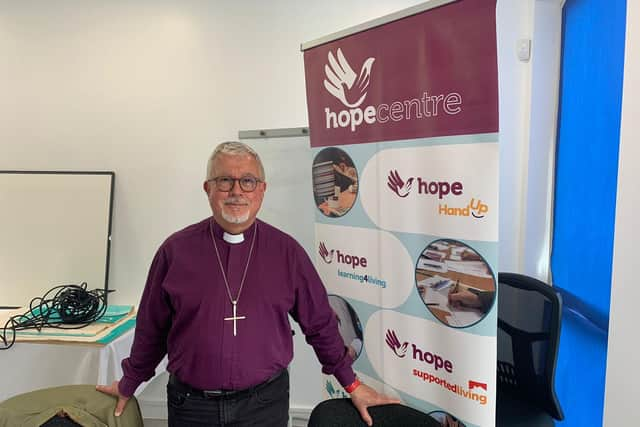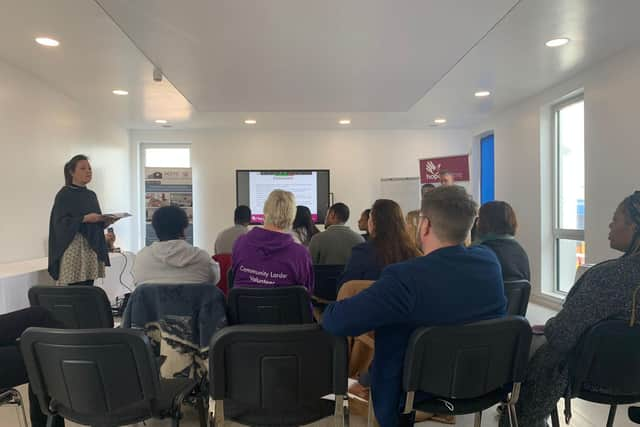Hope Centre launches poverty report which identifies 'super poverty' in Northampton
and live on Freeview channel 276
Northampton Hope Centre launched its 'Northampton Poverty Report' on Wednesday (March 9), which has identified "super poverty" in the town. Councillor Emma Roberts has called a "springboard for cooperation".
The report, commissioned one year ago to "identify need and provide understanding of the reality of poverty", was conducted by retired CofE Bishop Andrew Proud and written by Emma Matthews, who is currently doing humanitarian work in Jordan.
Advertisement
Hide AdAdvertisement
Hide AdData was compiled through fieldwork, "both group and individual", and supported through "desktop research". Chiefly, the report listened to people from "the most marginalised communities, especially black, Asian and EU groups, whose needs were greatest of all".


It identified that, while there were "significant levels of poverty in Northampton" before Covid-19, the pandemic has had a "significant impact on the scale and impact of poverty". The report even identified what it called "super poverty", where the person has "no income whatsoever, nor access to services" leaving them "open to exploitation".
Much of this was reportedly exacerbated by many being denied financial support from the government. However, some of the difficulties reportedly came from within their own communities.
Mr Proud said: "We discovered that worshippers within certain churches had huge pressure to give ten percent of their income to the church, which meant at times they couldn't feed themselves or heat their houses.
Advertisement
Hide AdAdvertisement
Hide Ad"For those who don't have strong language or IT skills, it can be hard for them to understand how to engage with the system. We found that many people in these communities learn about the system through word of mouth within the community that might lead to misinformation being passed around.


"In communities from Eastern Europe, like Polish and Lithuanian, there's a real distrust of authority and police; that's a feeling left over from Communism. They fear that by engaging with the system, they might get reported and deported.
"In Somali communities, people are raised not to complain about their problems and they don't want to share their problems. So they choose to hide them and that leads to a lot of stress.
"Many are actually unaware of the help that's available out there. When they have found people in the council or elsewhere that could help them, they often feel shunted from post-to-post, like no-one was really helping them."
Advertisement
Hide AdAdvertisement
Hide AdWhile the issues highlighted varied widely depending on the specifics of each community, the former bishop suggested that a communal approach between the various charitable groups in Northampton could be the best solution.
He said: "At the moment it's all very dispersed. If there was one place they knew they could go that would help solve the problem quite quickly, and I think we could get that set up quite quickly as well.
"It's about building trust and sharing our common humanity, not focusing on differences so much."
The event was attended by members of Northampton's United African Association, who read out quotes from the study to "bring their words to us" in the words of Mr Proud.
Advertisement
Hide AdAdvertisement
Hide AdThe association's chair, Anne Wankiiri, said: "It was during this pandemic that we realised the scale of the problem. A lot of people in the African community work in the healthcare system.
"The Covid-19 pandemic shut down much of the healthcare system. Many people work on zero-hours contracts and went from working six to seven days a week to two or three. So poverty set in rapidly."
One of the chief complaints from the event was that minority communities felt "ignored" by the council, with several speakers criticising a lack of direct contact between especially the Polish community and local leadership.
However, the event was attended by Labour Deputy Leader Emma Roberts and Councillor Danielle Stone, of Castle Ward.
Advertisement
Hide AdAdvertisement
Hide AdCllr Roberts said that she was "very pleased" by the report and described it as "a springboard for cooperation" between the various charitable groups concerned with poverty in Northampton.
The Cllr said that she hoped the council's upcoming poverty plan could work in tandem with the findings from the Hope Centre's report.